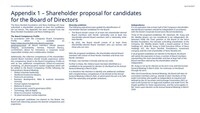
Novo Nordisk Foundation commits up to DKK 200 million to fund new platform to strengthen global defence against future pandemics
COPENHAGEN, Denmark, Oct. 13, 2025 /PRNewswire/ -- The AI-powered Global Pathogen Analysis Platform aims to strengthen the pandemic preparedness globally. The platform will provide a state-of-the art, analytical toolkit for analysing genomic pathogen data and will be freely available to users worldwide.
Infectious disease outbreaks are spreading faster than ever, yet the international surveillance that could help us monitor and prevent them remains fragmented.
To help close critical gaps in global infectious disease surveillance, a new international infrastructure is being established at the Technical University of Denmark (DTU) with partner nodes at University of Copenhagen, Statens Serum Institut and Imperial College London. The Novo Nordisk Foundation is funding the infrastructure with up to DKK 200 million.
The infrastructure is called the Global Pathogen Analysis Platform (GPAP) and will give scientists and public health authorities worldwide free access to cutting-edge tools for detecting, tracking and analysing infectious diseases with help from advanced bioinformatics and artificial intelligence (AI).
"Fragmented surveillance systems have left the world vulnerable to fast-moving outbreaks of infectious diseases. With the establishment of GPAP, we will get a secure, AI-powered data infrastructure that can deliver valuable support to researchers and public health authorities globally while being independent of commercial interests. The infrastructure will be free to use and specifically designed to meet the needs of low- and middle-income countries that currently lack access to such technology," says Lene Oddershede, Chief Scientific Officer, Planetary Science & Technology at the Novo Nordisk Foundation.
Stopping health threats before they go from local to global
Many infectious diseases spread between humans, animals, and the environment, and tackling them effectively requires an integrated approach. Therefore, GPAP is built on the principle of One Health — the recognition that the health of people is closely connected to the health of animals and the environment.
Building on existing platforms and expertise, GPAP will be designed as a secure online infrastructure that allows for integration of genomic pathogen data with other types of data. Data about different types of pathogens such as virus, bacteria and parasites can be combined with a range of different data sources, for example data on climate, human mobility and food trade.
The possibility of integrating and sharing different types of data on the same platform will help create a more complete understanding of the current and future health threats. This will give us the opportunity to act faster when a potential health threat is detected.
"It is crucial that we detect and respond to new health threats as quickly and as locally as possible. If we can stop an outbreak of an infectious disease before it goes from local to global level, we can prevent future pandemics," says Henrik C. Wegener, who will be heading GPAP.
AI-tools will help lower the technical barriers for users
The adoption of the WHO Pandemic Agreement in May 2025 underscored the urgent need for countries to share data and strengthen preparedness through equitable access to advanced technologies.
A key advantage of GPAP is the integrated, pre-trained AI-tools that make advanced analysis accessible without requiring users to build their own models. These AI features will help interpret complex genomic data, generate automated summaries of results, and act as a digital co-pilot for scientists and public health authorities.
By lowering technical barriers, particularly in low-resource settings, the platform enables more users to participate in genomic surveillance and provides faster, more accurate insights to detect and respond to emerging threats. Also, the users of GPAP will be retaining full control and ownership over their data.
Co-creation with global users
To ensure that GPAP is designed to match the needs of the users, the platform will be co-created in collaboration with users in low- and middle-income countries.
The co-creation will take place at so-called activator sites, where GPAP will be tested and developed in close collaboration with local scientists, health authorities and other potential users of the platform.
"The activator sites will act as pilot hubs, making sure the platform is practical, user-friendly, and tailored to real-world needs. By providing feedback and contributing data, they will help shape GPAP from the very beginning, while also building local capacity to detect and respond to outbreaks more effectively," concludes Henrik Wegener.
More details about the Global Pathogen Analysis Platform (GPAP)
GPAP will be established with its main hub at DTU's National Food Institute and with partner nodes at the University of Copenhagen, Statens Serum Institut, Imperial College London and encompass collaboration with international institutions across Europe, Africa, and Asia.
GPAP is developed in respect of and aligned to international and national legislation, regulations governing public health, animal health and environmental health as well as ethical aspects as covered, e.g., by the widely accepted FAIR and CARE principles.
The establishment and development of GPAP will be headed by Professor Henrik C. Wegener. He has a strong leadership track record in public health, science policy, and institutional development. Until March 2025, he was rector of University of Copenhagen. Prior to that, he led national, EU and WHO surveillance programmes and served as Chief Scientific Advisor to the European Commission. He currently chairs the board of the International Centre for Antimicrobial Resistance Solutions (ICARS).
The Novo Nordisk Foundation is supporting the establishment of GPAP with up to DKK 200 million over six years. As part of the project, a plan for long-term funding of the platform will be developed.
About the Novo Nordisk Foundation
Established in Denmark in 1924, the Novo Nordisk Foundation is an enterprise foundation with philanthropic objectives. The vision of the Foundation is to improve people's health and the sustainability of society and the planet. The Foundation's mission is to progress research and innovation in the prevention and treatment of cardiometabolic and infectious diseases as well as to advance knowledge and solutions to support a green transformation of society.
SOURCE Novo Nordisk Foundation







Share this article